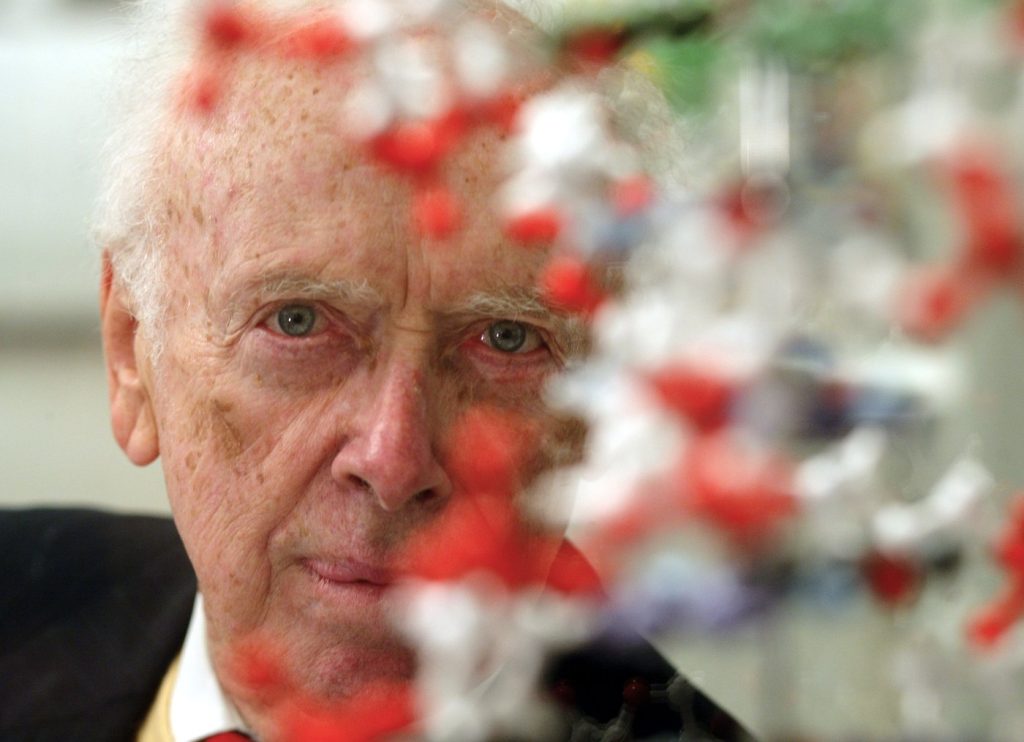James D. Watson, who co-discovered the double helix structure of DNA in 1953, has passed away at the age of 97. His groundbreaking work at just 24 years old ignited significant advancements in medicine, crime-solving, genealogy, and ethics, establishing him as a revered figure in science for many years. However, towards the end of his life, Watson faced backlash and professional censure due to controversial statements he made regarding race and intelligence.
In 1962, Watson shared the Nobel Prize with Francis Crick and Maurice Wilkins for their pivotal discovery that deoxyribonucleic acid (DNA) forms a double helix structure, which consists of two entwined strands resembling a twisted ladder. This revelation fundamentally changed our understanding of how genetic information is stored and how cells replicate their DNA during division. The imagery of the double helix became universally recognized, influencing art, postage stamps, and more.
The implications of the discovery allowed for remarkable developments in genetic research, including genetic modification, gene therapy, and the ability to identify human remains and criminals through DNA analysis. It also opened discussions on the ethical ramifications of manipulating genetic information, whether for cosmetic purposes or heritable traits.
Watson once remarked that his collaboration with Crick led to "the discovery of the century," asserting that they could not have anticipated the far-reaching impact of their finding. Despite not replicating such monumental success afterward, he authored influential textbooks, a best-selling memoir, and played a significant role in the Human Genome Project, mentoring emerging scientists and advocating for science policy reform.
Watson died in hospice care after a brief illness as confirmed by his son, Duncan Watson. His work was deeply personal, driven in part by a desire to understand and address illnesses like schizophrenia, which affected his son, Rufus.
While Watson's contributions to science are undeniable, his career was marred by inflammatory remarks, notably in 2007 when he expressed views about racial intelligence differences that attracted significant controversy and led to his suspension from the Cold Spring Harbor Laboratory, where he had held leadership roles for almost 40 years.
In a documentary in 2019, Watson reiterated that his views had not changed, prompting the laboratory to revoke several honors it had awarded him due to the reprehensible nature of his comments, which were deemed unsupported by scientific evidence. Dr. Francis Collins, former director of the National Institutes of Health, reflected on Watson's conflicting legacy, noting his scientific brilliance was overshadowed by his misguided and hurtful remarks about race.
Watson was known for his disregard for political correctness, having critiqued the narrow-mindedness of some scientists in his autobiography, "The Double Helix." His approach to science emphasized the importance of associating with intelligent peers and not shying away from controversies that might arise in pursuit of scientific progress.
The pivotal moment in Watson's scientific career came in 1951 at Cambridge University when he encountered Crick, with whom he forged a partnership characterized by youthful arrogance. Together, they utilized X-ray research conducted by Rosalind Franklin to decipher DNA's structure. Watson's portrayal of Franklin in his memoir faced criticism, as her contributions were often overlooked—a fact addressed by many in contemporary discussions about gender representation in science.
The breakthrough of the double helix is regarded as one of the most significant scientific discoveries, ranked alongside Darwin's theory of evolution and Mendel's laws of genetics. Following this achievement, Watson continued to shape the scientific field, establishing programs in molecular biology at Harvard and later becoming director of Cold Spring Harbor Laboratory and leading the Human Genome Project.
In 2007, Watson publicly expressed discomfort with the potential implications of genetic research concerning intelligence and criminal behavior, suggesting that scientific findings should be openly discussed, regardless of the discomfort they might cause. Born on April 6, 1928, in Chicago, Watson's pioneering spirit stemmed from an early interest in genetics and a fervent desire to uncover the essence of life, leading him to profound discoveries that changed the landscape of biology.
Despite his scientific legacy, Watson's later life was overshadowed by his controversial opinions, which cultivated a complicated legacy. He passed away with a life filled with remarkable achievements, but also a reminder of the importance of consideration in scientific discourse.












